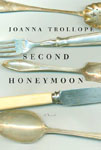Joanna Trollope
By her own admission, Joanna is not someone who loved her schooldays. 'I only really started to enjoy education when I got to university. No school can be blamed, however, it was more my childhood and adolescent sense of being an outsider, of not belonging (a very formative sense, I now know, for being a writer) that made me miserable at a time when 99.9% of children long to conform. But, I was very well taught, however, and I think I sensed this, even then.'
After winning a scholarship to Oxford University, Joanna joined the Foreign Office and then became a teacher. She began writing 'to fill the long spaces after the children had gone to bed' and for many years combined her writing career with working as a teacher. In 1980, Joanna became a full-time author. 'My first novel was written when I was 14, all about myself, of course (it is now kept under lock and key in case my children find it...) I suppose I wrote it for the same reason that I still write - to communicate. I don't think we should ever underestimate the power of story - story is how we negotiate with each other, how we build up relationships, how we learn. And nothing is so fascinating as good narrative - nobody of any age can resist What Happens Next ...'
Joanna still writes longhand and is happy to write almost anywhere - an airport departure lounge, a country kitchen table, or the quiet, west-facing study in her London house. For all her novels, Joanna undertakes meticulous research, involving huge amounts of interviewing and travel - often on foot or by London bus.
Joanna's first books to be published were a number of historical novels under the name Caroline Harvey. These were followed by Britannia’s Daughters, a historical study of women in the British Empire and more recently, her enormously successful contemporary works of fiction. The Choir was Joanna's first contemporary novel, followed by A Village Affair and A Passionate Man. The Rector's Wife, first published in 1991, was Joanna's first number one bestseller, and made her into a household name. Since then, she has written eighteen more bestselling contemporary novels.
She devotes a considerable amount of time to supporting her chosen charities and says, 'I’ve found a powerful speech aimed at roomful of men seems most effective in getting them to reach into their pockets, rather than being photographed with ‘dear disadvantaged children’. For me, it’s no good just being warm-hearted about charity, you have to be practical. If I can persuade people to support a worthwhile cause, then I’ve done a good job.' At present, Joanna is the Patron of the March Foundation; Patron of for Dementia and Patron of Mulberry Bush. Joanna also supports RNIB — especially the Right to Read Campaign (Joanna's books and Audio CDs are available from RNIB's National Library Service); the Meningitis Trust; Macmillan Nurses, Breast Cancer Care and the Gloucestershire Community Foundation.
Joanna is one of the judges for the Melissa Nathan Award and she joined the Advisory Board of the Costa Awards in 2008, having chaired the Judging Panel for the 2008 Awards. In 2012, Joanna was 20Chair for the Orange Prize20 and was on the judging panel for the Sunday Times EFG Private Bank Short Story Award.
Joanna's family is hugely important to her. She is the eldest of three, the mother of two daughters, stepmother of two stepsons, and, now, is immensely enjoying being a grandmother. She has been married twice and now lives on her own in London. Joanna still has the same core group of close friends she's had for the past thirty years, and many friends in the world of writing.
When Joanna considers what has happened to her career in the last ten years, she often thinks, as her friend Jilly Cooper once said, 'You’d believe it, wouldn’t you, if it happened to someone else'.





